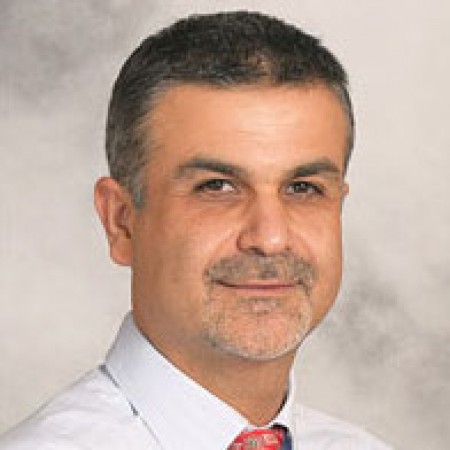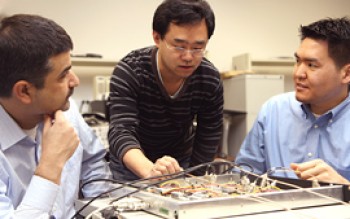Ph.D. - Electrical Engineering
University of Texas at Austin - 1999

Professional Preparation
M.S. - Electrical & Computer Engineering
The University of Texas at Austin - 1995
The University of Texas at Austin - 1995
B.S. - Electrical & Electronics Engineering
Hacettepe University - 1992
Hacettepe University - 1992
Research Areas
Research Interests
- Optimizing radio link protocols over wireless links
- Spectrum sensing for cognitive radios
- Experimental evaluation of space-time coding and MIMO algorithms
- Low-Complexity receivers for CDMA, MC-CDMA, and OFDM-CDMA Systems
- Multiple antenna testbed development
- Vector Channel Modeling for smart antenna systems
- Radio Resource Management in Space Division Multiple Access Networks
- Real-Time Implementation of Wireless Systems
Publications
S. Ciftci and M. Torlak, "A Comparison of Energy Detectability Models for Cognitive Radios in Fading Environments," in press, Wireless Personal Communications. In Press - Publication
S. Ozyurt and M. Torlak, "Performance Analysis of Optimum Zeroforcing Beamforming with User Selection," in press, IEEE Communication Letters. In Press - Publication
S. Ozyurt and M. Torlak, "Exact joint distribution analysis of zero-forcing VBLAST gains with greedy ordering," submitted, IEEE Trans. Wireless Communications, Jan. 2012. 2012 - Publication
A. Morshedi and M. Torlak, "Measured Comparison of Dual-Branch Signaling over Space and Polarization Diversity," IEEE Trans. On Antennas and Propagation, pp. 1678-1687, vol. 59, no. 5, May 2011 2011 - Publication
D. Kim, V. Gopalakrishna, S. Guo, H. Lee, M. Torlak, N. Kehtarnavaz, A. Lobo, and P. Loizou, "On the Design of a Flexible Stimulator for Animal Studies in Auditory Prostheses," Journal of Biomedical Signal Processing and Control, vol. 6, no. 4, Oct. 2011, pp. 346.355. 2011 - Publication
S. Ozyurt and M. Torlak, "An Exact Outage Analysis of Zero-Forcing V-BLAST with Greedy Ordering," Proc. IEEE Broadband Wireless Access Workshop, Dec. 5-9 2011, pp. 1-5, Houston, Texas. 2011 - Publication
S. Ozyurt and M. Torlak, "Performance Analysis of Orthogonal Beamforming with User Selection in MIMO Broadcast Channels," Proc. IEEE Global Communications Conf., Dec. 5-9 2011, pp. 1-5, Houston, Texas. 2011 - Publication
S. Ozyurt and M. Torlak, "Unified performance analysis of orthogonal transmitbeamforming methods with user selection," submitted, IEEE Trans. On Wireless Communications, Dec. 2011. 2011 - Publication
Appointments
Associate Professor
University of Texas at Dallas [2005–Present]
University of Texas at Dallas [2005–Present]
Assistant Professor
University of Texas at Dallas [1999–2005]
University of Texas at Dallas [1999–2005]
Principle DSP Engineer
Cwill Telecomm. Inc [1998–1998]
Cwill Telecomm. Inc [1998–1998]
Principle DSP Engineer
Cwill Telecomm. Inc [1997–1997]
Cwill Telecomm. Inc [1997–1997]
Research/Teaching Assistant
UT Austin [1994–1999]
UT Austin [1994–1999]
Projects
Performance Gains of Opportunism in Wireless Communications
2007–2007 Performance Gains of Opportunism in Wireless Communications August 1, 2007, Bogazici University, Istanbul, Turkey.Performance Gains of Opportunism in Wireless Communications
2007–2007 July 31, 2007, Koc University, Istanbul, Turkey.Performance Gains of Opportunism in Wireless Communications
2007–2007 July 17, 2007, Bilkent University, Ankara, Turkey.Research Activities in Wireless Information Laboratory
2006–2006 Intel Visit, Richardson, TX, Nov. 17, 2006.Opportunistic Beamforming Methods in Wireless Communications Systems
2006–2006 IEEE-Dallas Antennas & Propagation Society Meeting, Oct. 30, 2006, Richardson, TX.Additional Information
Grants Received
- Open Architecture Research Interface for Cochlear Implants, Drs. Philip Loizou, Murat Torlak, Nasser Kehtarnavaz, Hoi Lee, and Anu Sharma, National Institute of Health, $1,297,458, 2006-2008.
- Novel Techniques for Performance Enhancement of OFDM Communications Systems, Drs. K. Kiasaleh and M. Torlak, Texas Instruments, Inc, Dallas, Texas, $60,000, 2006-2007.
- A systematic framework for integrating multiple antenna systems and MAC protocols, Drs. Murat Torlak, Andras Farago, Naofal Al-Dhahir, and Kamil Sarac, Project Emmitt, Unfunded National Science Foundation, $120,000, 2005-2007.
- MIMO Beamforming, Drs. K. Kiasaleh and M. Torlak, Texas Instruments, Inc,Dallas, Texas, $60,000, 2003-2005.
- Enhanced High-Speed Data Services 3G Cellular Wireless Networks, Drs. A. Nosratinia and M. Torlak, ATP/Texas Higher Education Coordinating Board,$141,500, 2004-2005.
- Generic Autonomous Platform for Sensor Systems (GAP4S), Drs. F. Maloberti, A. Fumagalli, J. Liu, and M. Torlak, National Science Foundation, $300,000, 2002-2005.
- Efficient Algorithms for Improved TCP/RLP Operations, Drs. A. Nosratinia and M. Torlak, Nortel Networks, $25,000, 2003-2004.
- A study of Radio Determination Satellite Service (RDSS) Systems, Drs. M. Torlak and William P. Osborne, Innovative Solutions International, Inc. (Department of Defense), $149,979, 2001-2003.
- Development and Implementation of 2.4 GHz Wideband Smart Antenna Software Radio Testbed, M. Torlak, Texas Telecommunication Engineering Consortium (TxTEC), $13,000, 2000-2001.
- Detection of QPSK Signals in an Impulsive Noise Environment, M. Torlak, ESpectrum, Inc., 3/2000-8/2000, $2500.
- Research in Wireless Communications, M. Torlak, Cwill Telecomm., Austin, TX, $5,000
- Development of Embedded Systems Laboratory, Drs. M. Nourani and M. Torlak, UTD College of Engineering and Computer Science, $90000, 1999-2000.
- Development of Embedded Systems Laboratory, M.Torlak, Texas Instruments DSP University Program, 2000, $25099 (equipment donation).
Honors and Awards
- Outstanding Service Award: IEEE Signal Processing Society Dallas Chapter, 2004
- Best Paper Award: 5th World Multi-conf. on Systemics, Cybernetics and Infor, 2001
- Faculty Fellow: Texas Telecommunications Consortium, 2000
Sponsers
News Articles
Project Helping Shape Future of 4G Communications
 Key elements of the next-generation of mobile technology are under development at UT Dallas, promising better Internet access, lightning-fast downloads and seamless global roaming.
Key elements of the next-generation of mobile technology are under development at UT Dallas, promising better Internet access, lightning-fast downloads and seamless global roaming.A two-year project focuses on the advanced algorithms required to orchestrate the complexities of fourth-generation, or 4G, communications. Those complexities arise in part from what’s known as MU-MIMO – multi-user, multi-input, multi-output technology – and particularly from the proliferation of antennas.
Project Helping Shape Future of 4G Communications
 Key elements of the next-generation of mobile technology are under development at UT Dallas, promising better Internet access, lightning-fast downloads and seamless global roaming.
Key elements of the next-generation of mobile technology are under development at UT Dallas, promising better Internet access, lightning-fast downloads and seamless global roaming.A two-year project focuses on the advanced algorithms required to orchestrate the complexities of fourth-generation, or 4G, communications. Those complexities arise in part from what’s known as MU-MIMO – multi-user, multi-input, multi-output technology – and particularly from the proliferation of antennas.